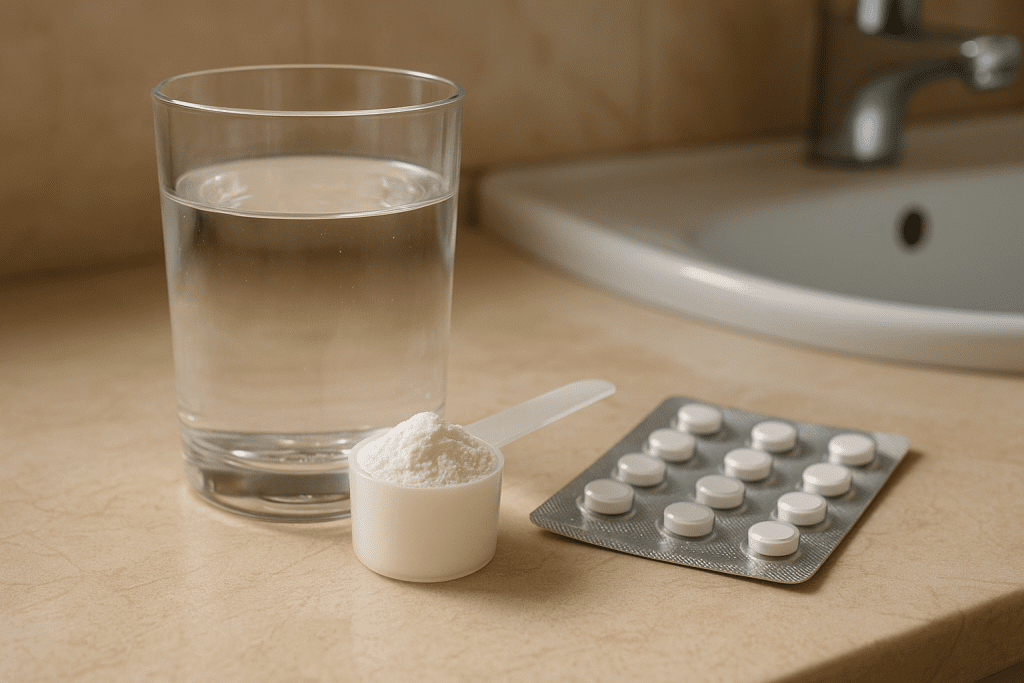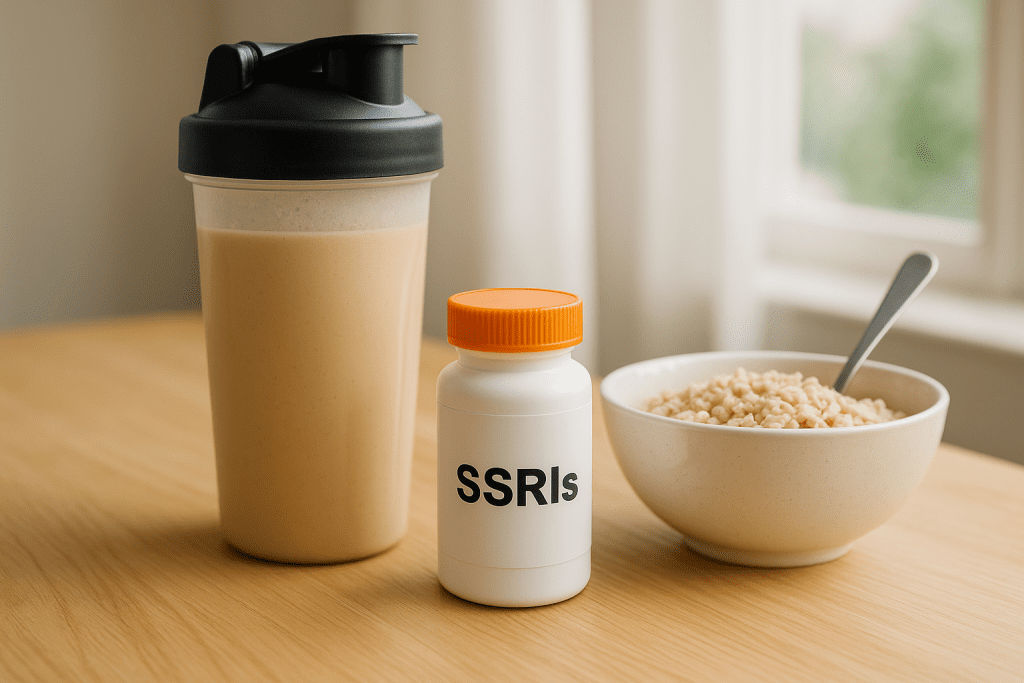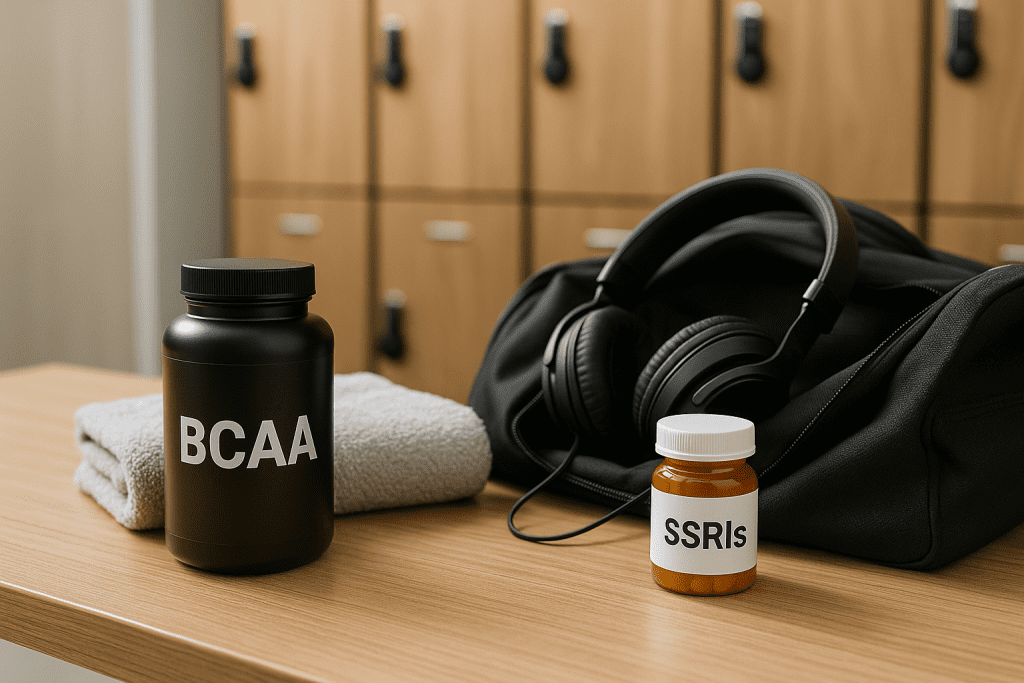Can you safely build muscle while taking SSRIs? Yes, but not all supplements play nice with antidepressants. This expert guide breaks down which bodybuilding supplements are SSRI-safe, how to avoid risky combinations, and what science says about stacking creatine, protein, and BCAAs with antidepressants.
If you’re working on your mental health and training goals simultaneously, keep reading to learn how to fuel both safely.
Summary / Quick Answer
Here’s what the research says about safe supplement use for muscle building with SSRIs:
- Whey Protein: Safe. No known interactions; natural food-derived.
- Creatine: Safe and potentially helpful. May enhance SSRI effectiveness.
- BCAAs: Safe in normal doses. Minimal risk.
- Avoid: 5-HTP, St. John’s Wort, or any supplement affecting serotonin levels.
Bottom line: The top three bodybuilding supplements—protein, creatine, and BCAAs—are safe with SSRIs when used as directed. Creatine may even support a faster antidepressant response.
Protein Powders and SSRIs: A Safe Combination
Whey and other protein powders are often the first supplements new gym-goers try. The good news: they’re generally compatible with SSRI medications, posing no significant risk.

Why Protein Is Safe
Protein supplements are made from amino acids found in food. While some worry about tryptophan (a serotonin precursor), clinical consensus shows it doesn’t raise serotonin enough to cause issues when consumed in typical amounts. One physician put it plainly: “If tryptophan in protein caused serotonin syndrome, eating turkey would be dangerous.” source.
Clinical Evidence and Expert Consensus
Multiple sources, including Practo, confirm that whey protein has no known interaction with antidepressants. For those without kidney conditions, research supports its safety at recommended doses (PMC).
For more on natural remedies and interactions, read Insomnia from St. John’s Wort and SSRIs.
Best Practices
- Stick to standard doses (20–30g per serving)
- Choose high-quality, third-party tested products
- People with kidney issues should consult their doctor
| Protein Type | SSRI-Safe? | Notes |
|---|---|---|
| Whey | Yes | No known interactions |
| Casein | Yes | Slow-digesting alternative |
| Vegan Blends | Yes | Pea, rice, hemp safe |
Creatine and SSRIs: A Promising Pair
Creatine is one of the few supplements that may not only be SSRI-safe but also complement antidepressant therapy.

Research on Creatine’s Safety
There are no documented negative interactions between creatine and SSRIs (Drugs.com). Health authorities like Examine and Healthline support creatine’s safety at 3–5g/day over extended use.
Creatine’s Antidepressant Support Role
Here’s where it gets interesting: several studies suggest that creatine may enhance or accelerate SSRI effects, especially in women with depression.
- A 2015 study in PMC found faster responses when creatine was added to SSRI therapy
- Creatine supports brain energy metabolism, which may indirectly improve mood (Psychiatric Times)
- Results show improved treatment response within 2 weeks when paired with SSRIs (NEJM Journal Watch)
See more on this in our feature: Creatine SSRI synergy explained.
Safe Usage Guidelines
- Dose: 3–5g daily
- Form: Creatine monohydrate
- Cycle optional, long-term use appears safe
BCAAs and SSRIs: Generally Low Risk
Branched-chain amino acids (BCAAs) – leucine, isoleucine, and valine – are popular for muscle recovery and lean mass support. Fortunately, they show no meaningful interaction risk with SSRIs.
Mechanism and Safety Context
BCAAs are building blocks of protein, not neurotransmitter precursors. They don’t raise serotonin levels directly. Medical Q&A platforms like HealthTap confirm their compatibility with SSRIs like sertraline.
Anecdotal reports back this up:
“I’ve taken SSRIs and BCAAs for years with no issues.” Reddit
Use Caution With Other Amino Acid Supplements
BCAAs are safe, but avoid supplements like 5-HTP or L-tryptophan, which directly influence serotonin. These can cause serotonin syndrome if mixed with SSRIs. Learn more in our post on Antidepressants and 5-HTP serotonin syndrome risk.
| Supplement | Interaction Risk | Notes |
| BCAAs | Low | Safe with SSRIs |
| 5-HTP | High | Direct serotonin influence |
| L-Tryptophan | Moderate-High | Monitor dosage closely |

Practical Safety Tips When Mixing Supplements and SSRIs
Even with safe supplements, combining anything with prescription meds requires a few extra steps:
- Consult your doctor, especially if you take multiple meds
- Start one supplement at a time to watch for side effects
- Use verified, interaction-free products like Thorne Labs supplements
- Stick to science-backed doses, not influencer stacks
- Watch for subtle signs of serotonin overload: anxiety, tremor, agitation
And most importantly: remember that what’s safe for one person may not be for another. Mental health, genetics, and metabolism all play a role.
Conclusion
For those balancing strength goals with mental health, the right supplement choices matter. The science shows that whey protein, creatine, and BCAAs are safe to use with SSRIs when taken responsibly. Creatine even offers potential benefits for antidepressant effectiveness. Just as important, avoid serotonin-boosting supplements like 5-HTP unless directed by your provider.
When in doubt, always consult with your healthcare provider before introducing new supplements. And for more safe-stacking insights, check out our reviews of Certified interaction-safe multivitamins or our deep dive into brain fog from B vitamins and migraine medication.

